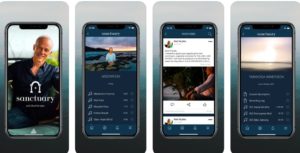Filter by Category
Filter by Category
Contents
What is white label social network software?

Facebook, Instagram, Twitter, LinkedIn, Pinterest, YouTube, Snapchat – these are all public social media platforms. And they all have oceans of members, accounts, and content that inundate members every day, all day, and into the night. They host millions upon millions of conversations with the ability of members to like, share, and engage in discussions. Organizations can often feel that they are “lost” in this ocean of public platforms.
One of the solutions that businesses have found, is to set up what is now termed “white label social networks” – a type of “members only” social network to which membership is limited to those who are “allowed” to join. This keeps the membership low and confined to those who are actually involved in some way with the organization. Typically, they are attractive to large enterprises who want only internal members, non-profits that want staff, donors, and others who provide support to have a sole-purposed venue, and even businesses who want a forum for their customers.
To join such white label social networks will typically involve registration and acceptance, along with a username and password that will allow entry.
Benefits of a white label social network
Any organization can create an official page on virtually any social media platform. And it can work to drive current and potential followers to that account. But it is one of the millions out there. And it may be uncomfortable for that organization to publish posts that are meant only for their staff, their loyal customers, their donors, and such. They may want a more intimate relationship with these individuals, a place in which more open communication is possible. Consider the possible reasons for a white label network:
- Having a “members only” social platform makes your loyal customers feel special – rather like members of a private club. When customers are members of a community, the chances of retaining them for future purchases are much greater.
- Having a platform for people with common interests stimulates conversation about a company’s products and services. Often, members will suggest unique uses for a product (e.g. WD-40)
- It’s easier to respond to issues and concerns when they are in a smaller community space, and a company’s responses reach all “members.”
- Social listening is easier. Individuals in charge of maintaining the platform can receive alerts of comments and feedback and respond immediately.
- Control. Having accounts on major public social media platforms means an organization must conform to their “rules” and algorithms. On Instagram, for example, organizations show up on searches, based upon the “popularity” of their account. With a white label platform, the organization has total control. And it is the perfect place to turn fans into brand advocates when they do participate in public platforms. They can become brand ambassadors for an organization with their larger tribes on public platforms. And, they can encourage their communities to join an organization’s platform.
Choosing a White Label Social Network
White label social network software may contain discussion forums, messaging, groups, and the capability for users to establish friendships with one another. In addition to this, there may be content archives as well as metrics/analytics tools. Before you decide which social network to use, you must decide on which features are most important to you. In some cases, you may simply want forum software. In others, you may decide that you want a fully-developed social media environment.
Here is a list of popular white label social network features you will want to consider based upon your goals:
- Rather than a “canned” software, you may want to customize for your brand – logos, colors, background, and menu
- How do you want members to communicate with one another – just by posting? Can they choose to message one another privately?
- Can members “friend” one another?
- If your group is very large, do you want to segment into sub-groups based upon specific interests?
- Do you want to archive content and add search features to find older content?
- What types of analytics do you want to incorporate? You can discover what types of content are most popular, even what days and times your members access so that you can provide new and important content during those times.
- Do you want a native app? Probably so. After all, most social media users today are on mobile devices, and you want to catch them on their preferred devices.
Should You Buy or Build a White Label Social Network?
You’ve decided that you want to create an online social community, either for your employees, your members, or your customers. Maybe your community will be for a combination of all of these. You’ve also determined which features you need, and what you want to get out of your efforts. Now, you have to determine if you are better off building your network yourself or purchasing an out of the box solution.
Let’s take a look at the pros and cons.
Out of the Box – Pros
- Cost: It will obviously be much cheaper to buy a “canned” solution
- It can be set up quickly without any need for coding or development
- Many canned solutions allow you to segment different groups – employees, customers, etc.
Out of the Box – Cons
- Lack of flexibility. You will be confined to what the canned solution provides
- Scaling can be a problem. You may be limited to the size of your group
- You could be limited to the amount of archiving you can have
Building Your Own – Pros
- Total Control. Based on the features that you want, a “build your own” solution can provide all for all of these
- Ability to scale. If you use a good developer, features can be added as you choose
- Customization. This is a big factor if you know exactly what features you want.
Building Your Own – Cons
- Cost. This is by far the more expensive way to go. You will need to hire a developer, and it can get pricey
- A long-term contract for additional features as you scale will be necessary.
- This is probably not a good option for small to mid-sized organizations
A Third Option – a Hybrid
This would include “canned” solutions along with the additional features as you decide you want. Disciple offers just such a solution, so be sure to check it out.
Disciple combines out-of-the-box convenience with the ability to tweak virtually every aspect of your app to suit your particular needs. That means when you buy social network software from Disciple Media, you can pick and choose from our extensive array of features including:
Messaging – Unlike many a social media platform, private messaging is built right into the Disciple software. Group messaging is another powerful method of engagement we offer that bolsters a sense of unity among users.
Member profiles – Member profiles is an oft-overlooked way to gather useful information that can be leveraged to help guide community-building efforts. Find out who your members are, where they are and what they want by the way you configure member profiles.
Threaded comments – This is a great way to get small groups of individual members interacting with one another, but it’s not offered on all social networks. If you really want to ramp up engagement, threaded comments are a must.
Push notifications – You have multiple choices when it comes to how you configure Disciple push notifications, or whether you use them at all. It’s up to you.
Polls – Activate the Polls feature on your Disciple white label social network software to let your members have their say on issues important to the community. You can also use polls to float product ideas or encourage community ideation.
If You Build It, You Can Control It
One of the most frustrating aspects of trying to nurture a community using a Big Tech social media platform is the lack of control. Everything from what happens to user data to moderation decisions are subject to the overriding corporate agenda.
When you buy social network software from Disciple, that control is returned to you, where it belongs. You moderate user-generated content and activity. You set the terms of engagement and you decide what’s acceptable and what is not.
With Disciple, you also retain ownership of all your data. No more losing members who are tired of data breaches and Big Brother monetising their personal information. Your private social media platform is genuinely private, which is one of the best reasons to buy social network software.
Examples of white label social networks
Country music star Luke Bryan and his team wanted to create an app to support his community of fans. However, they also wanted to avoid the toxicity of standard social media platforms. Instead, they preferred to build a community around a mutual love of Bryan and his music. The online community consists of content specially created by Bryan’s team as well as content shared by community members.
Bass IQ is an educational community for students interested in bass fishing. They decided to create a white label social network to offer content, community, and classes to the students who have joined the Bass IQ community.
School districts often set up white label social networks for the benefit of teachers, administrators, parents, and students. These become a forum for important information, for promotion of events, and for discussion among these members regarding issues that are important to them. “Outsiders” are not welcome because they have no personal interest.
Final Thoughts
Brands, artists, educational communities, and non-profit groups are increasingly embracing the idea of using private social media to create engagement and boost revenue. Armed with the information above, you should be able to decide if this is a viable option for you, and how you might want to proceed.

Nicole Garrison in
28 December, 2023
6 min read
Share:

See how Disciple can fit your business needs

Nicole Garrison in Community monetization
Nicole Garrison in
Community monetization
Community monetization
28 December, 2023
Related Articles
8 min read
Everything you need to know to create a social network.
We have been asked many times about the best ways to create a social network. So, we decided …
9 min read
How to create your own social network
Social media has become an integral part of our daily lives. We use social platforms to be informed, …
18 min read






